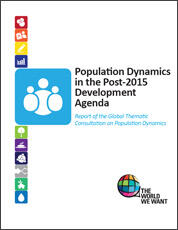
Publication
Population and sustainable development in the Post-2015 agenda
Report of the Global Thematic Consultation on Population Dynamics
Number of pages: 56
Publication date: 01 Jan 2014
Author: UNFPA
Publisher: UNFPA, UNDESA, UN-HABITAT, IOM

Publication
Number of pages: 56
Publication date: 01 Jan 2014
Author: UNFPA
Publisher: UNFPA, UNDESA, UN-HABITAT, IOM
The Outcome Report of the Global Consultation on Population Dynamics and the Post-2015 Development Agenda makes the clearest and strongest case to date why population issues must be integrated in the new development agenda.
The Outcome Report of the Global Consultation on Population Dynamics and the Post-2015 Development Agenda not only explains the linkages between today's most pressing development challenges, population dynamics and sexual and reproductive health and rights, but also provides concrete recommendations on how to address these linkages in the post-2015 development agenda. To date, this report makes the clearest and strongest case for why population matters for the post-2015 development agenda and for why the ICPD Programme of Action must be firmly integrated into this new agenda.
The Global Consultation on Population Dynamics and the Post-2015 Development Agenda -- which was led by UNFPA in partnership with UN DESA, UN Habitat and IOM, as well as the Governments of Bangladesh and Switzerland -- benefited from inputs of many other sister agencies and hundreds of stakeholders. During the past year, the global consultation included a global online discussion, as well as several face-to-face meetings with stakeholders. The inclusive process of the consultation on population dynamics resulted in an authoritative position on how population dynamics affect the major development challenges of the 21st century, and on how population dynamics are best integrated and addressed in the post-2015 development agenda.
The two overarching messages of the report are the following:
Whatever form the post-2015 development agenda will take, the emphasis will be on making a difference in the lives of people. To this end the agenda must systematically take into account the changing number, age and location of people. It will be impossible to meet the needs of people and to promote the wellbeing of both current and future generations, if we do not know how many people are living and will be living on this planet, where they are living and will be living in the future, and what their age distribution is now and in a few decades from now. The new development agenda must consider these population dynamics and address the associated challenges. There will also be a need to find a harmonious balance between the complex social, economic and environmental development agendas.
Population mega trends at the national and global levels — continued rapid population growth, population ageing, urbanization and migration — not only frame the entire development debate, they demand a reconsideration and re-conceptualization of what will be the main challenges for the post-2015 development agenda. Without adequate understanding of how the world is changing from a demographic perspective, forward-looking planning and agenda setting will be of little value. For this reason, the importance of population dynamics was highlighted in the outcome document of the Rio+20 conference “The Future We Want” and in the report of the United Nations Task Team on the post-2015 development agenda “Realizing the Future We Want for All”.
Ongoing demographic changes influence all of the concerns and objectives at the top of international and national development agendas. They shape and are shaped by economic development, employment, income distribution, poverty, social protection and pensions; they affect and are affected by access to health, education, housing, sanitation, water, food and energy; and they influence and are influenced by the sustainability of cities and rural areas, environmental conditions and climate change.
To learn more about the integration of population dynamics in the post-2015 development agenda, visit www.worldwewant2015.org/population or contact Michael Herrmann at herrmann@unfpa.org